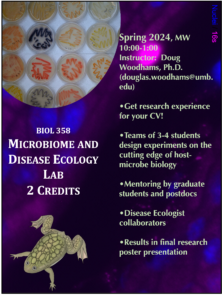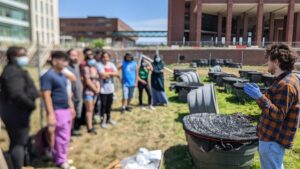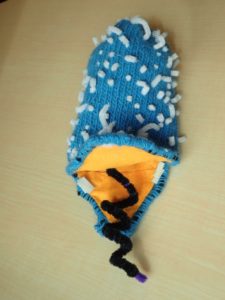

Undergraduate researcher, Victor Quadros, introducing students of Disease Ecology to the outdoor artificial ponds housing Eastern newts.
Teaching
“As a teacher of ecology, I aim to inspire a fascination in discovery and an appreciation for the intricate beauty of nature. Beyond learning facts and methods, I hope my students will develop a connection with the subjects they study. Emerging disease and biodiversity loss are heavy topics, but rescuing species is an achievable conservation challenge highlighting the significant contributions still to be made in basic and applied science.”
-Professor Doug Woodhams
Teaching is a scholarly activity, and active learning in the classroom can also lead to advances in the field, led by students. Several undergraduate students in Professor Woodhams’s courses have published their work. In addition to teaching interactive courses, mentoring undergraduate and graduate trainees is at the core of Professor Woodhams’s research projects and mission to produce excellent future biologists, global citizens, and adept employees in medicine, biotechnology, and wildlife biology.
Professor Woodhams offers the following courses:
BIOL 357 Comparative and Ecological Immunology
BIOL 354 Infectious Disease Ecology and Evolution Disease Ecology and Evolution Syllabus
BIOL 358 Mentored Research Lab course on Microbiome and Disease Ecology
BIOL 646/647 Graduate Seminar in Disease Ecology and Microbiome Bioinformatics Lab Microbiome and Disease Ecology Syllabus
BIOL 653 Current Literature in Microbiology and Immunology (fall and spring semesters) undergrads welcome with permission
Course Descriptions
BIOL 357 (3 credits): Comparative and Ecological Immunology is an advanced undergraduate level course that explores the philosophy of immunology, the evolution of immune systems, and the integration of ecological and evolutionary concepts important for biomedicine. By comparing different systems from viruses, bacteria, plants, nematodes, insects, and vertebrates, students will gain perspective on the development and function of immune systems. The course will cover the emerging concepts of biological individuality (self and the microbiome) and models of immune development and response. Intended to complement, but not to replace, a course in human immunology, students will learn about trade-offs with immune function, and how immunological responses of individuals scale up to the population and ecosystem levels by exerting influence on pathogen transmission. In particular, comparative sickness behaviors, social distancing, and pathogen avoidance behaviors will be one focal topic. Traditional components of immunological study will be contextualized within model systems forming the core of the course (taxonomic and anatomical comparative immunology) and include mucosal immunity, neuroimmunology, innate immune priming, and adaptive immunity.
BIOL 354 (3 credits): In Infectious Disease Ecology and Evolution, students are given an overview of the variety and ubiquity of disease systems, and introduced to conceptual and theoretical underpinnings of disease causation, transmission, emergence, management, and host-parasite coevolution. Because the field is highly interdisciplinary, I introduce basic principles of comparative and ecological immunology, parasitology, microbial ecology, epidemiology and spatial modeling, genetics and genomics, and current methodological approaches to disease ecology research in marine, freshwater, and terrestrial systems. This course incorporates team projects and weekly student-led discussions of primary literature.
BIOL 358 (2 Lab credits): The Microbiome and Disease Ecology Lab is a course-based undergraduate research experience. Students will gain practical experience in a research lab, including formulation of hypotheses, experimental design, data collection and analysis, and presentation of results. Students will learn collaborative research skills and contribute new biological knowledge in microbiome and disease ecology. Results may contribute to co-authored publications. Graduate student research mentors, visiting disease ecologists, and an opportunity to attend a research conference are supported by a National Science Foundation Career Award.
BIOL 646 (3 credits): This graduate seminar on Disease Ecology will teach students to ask questions that will advance the field of disease ecology. The specific areas covered in the course will vary from year to year, depending on current research in disease ecology, with possible foci such as host-symbiont biology, immunomics, or wildlife disease emergence and management. Students will gain hands-on experience with data analysis tools with the goal to produce, as a team output, a publishable manuscript. Students will learn to access public data resources for future studies, and be equipped for research on microbiomes from sample collection to Illumina sequencing to bioinformatics. Previous iterations of the course have resulted in team publications from data synthesis.
BIOL 647 (1 Lab credit): Data Analysis for Disease Ecology. Microbiomes are increasingly being studied for their symbiotic relationships with hosts, their role in ecosystem processes and understanding their distribution and biogeography across the globe. Analysis of these data requires the use of a suite of bioinformatics pipelines and analysis tools. In this workshop style class students will gain hands-on experience with microbiome data analysis pipelines, including data processing and exploration in QIIME2, data analysis in R, as well as other tools. The focus will be on analysis of microbiome data, but can be applied in broader contexts to other data from next-generation sequencing from targeted amplicon sequencing to shotgun metagenomics. Special topics will range from network analysis, to metabolomics, to complex multivariate statistics for time series of microbiome data. Students will be given the opportunity to work with their own data as well as instructor-provided tutorial data. Attendance will be graded along with weekly code submissions (50%) and one team-based project presentation (50%).
BIOL 653 (1 credit): The goals for this course are to provide a relaxed atmosphere for in-depth discussion of current literature. Graduate students, postdocs, undergraduates, and occasional visiting professors join in the discussions. Most students do not take the course for credit, but find it valuable to participate.
What students are saying
“It was a pleasure to have Dr. Woodhams as an instructor. He is very understanding, compassionate, and knowledgeable. I would very much like to continue to work with him on his research and continue learning about diseases and ecology.”
“I definitely learned a lot and became much more comfortable talking about and reading primary articles.”
“Most helpful in this seminar has been the use of new tools to make analysis. People not related to this topic (Microbiome and disease ecology) now can potentially incorporate this topic into their own projects because of the new tools used in this class.”
“The class presentation and ensuing discussion were definitely helpful. Much more so than just reading papers.”
“Communication is good inside and outside of class in terms of keeping everyone up to date.”
“Your class really made me see medicine as a global phenomenon, rather than a situation exclusive to an individual patient. After your class, I have realized that I would really like to pursue global health research in addition to practicing as a physician.”
Two of Dr. Woodhams’ students, Jonathan Benney and Nikhil Illa, got creative for an extra credit project in Dr. Woodhams’ Infectious Disease Ecology class. Thier video/rap outlines the lifecycle of the protozoa Plasmodium, the disease agent of Malaria.
Each January, UMass Boston students are selected to participate in the Research Immersion Project (RIP), sponsored by the Initiative for Maximizing Student Development (IMSD). Students design and carry out original research projects and learn laboratory techniques. In 2016, a few RIP students took some photos and videos of their time in the Woodhams lab with instructor, Brandon LaBumbard. Thanks to participant, Kiloni, for putting together this video!

A knitted Rabies virus made by Kelsie Leonard as a visual aid for Disease Ecology and Evolution.